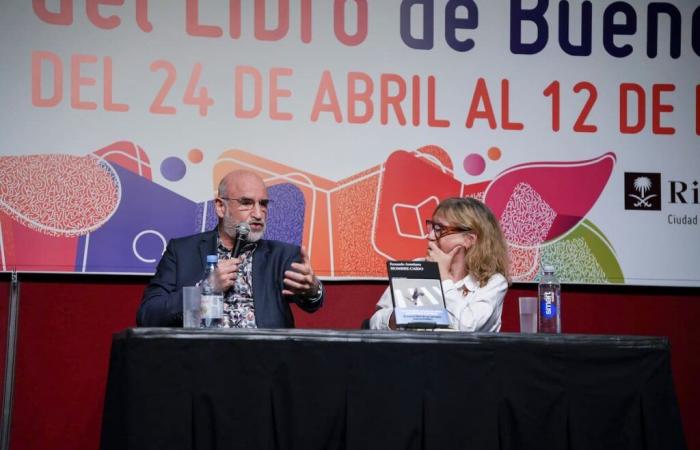On the last Wednesday of the 49th edition of the Buenos Aires Book Faira multitude of students of secondary schools in the city of Buenos Aires and the Buenos Aires suburbs toured the rural with the teachers, forming swirls in stands of the different pavilions, such as the creak, Uranus, VR editors, the Dickens bookstore (with promotions), Elektra Comics, Edelvives, the seven logos and area explores, among others. Many rowed in Sirveahora, to prepare solidarity hygiene and internment kits.
From 20, Thanks to the free income that extends until Thursdayhe joined more public despite the drizzle. “All people who could not come on Tuesday came for the collective strike”Said an authority of the El Book Foundation, which already begins to elaborate the balance.
Two of the most convening acts of the day were that of the social leader Juan recordois, which filled the José Hernández room in the presentation of Human Argentinabook that includes a different government plan (if not opposite) from which anarchocapitalism applies in Argentina, and that of the Spanish writer resident in Germany Fernando Aramburu (San Sebastián, 1956), who spoke with the Hinde Pomeraniec journalist and writer about the volume of stories Man down (Tusquets) in the Julio Cortázar room.
“This city is a talisman for me, it brings me good luck and I am tempted to stay”, Said Aramburu in an unexpected comment in the style of Mirtha Legrand, which raised the astonishment of the audience.“I am not a compulsive writer; I am rather ruminant: I give many laps to each paragraph, ”he had on his writing method. I dedicate my entire day to take care of the page. ”
He said he had the habit of putting his works “at rest” to review them again, “without prejudice and without mercy”, and acknowledged that, although it gradually advanced “Towards a succinct style, nothing baroque, nothing flowery, which does not imply less work”As a reader was not closed to anything.“ Sometimes I feel like reading a boring book; I do not know if I am a good reader, but of regular and daily reading, ”he replied before revealing that he participated in a gathering of readers who commented on their unpublished.
Pomeraniec wanted to know if Aramburu, who in 2023 had published his poetry gathered (Body symphony), I was writing poems. “My basic need for poetry satisfied her with the poetry of others“, Replied. Poetry reading, along with the Sudoku, the nap, classical music, newspapers and magazines, are part of the Spanish writer’s diet. Write literature” in total silence and absolute solitude. “
For Aramburu, “a story that is not very good is not worth” And, although he remarked that he was not aware of the issues to write, he warned that a reason for his literature was the presence of characters “forced to live with a type of disadvantage or have to deal with a loss.” In a fun moment of the talk, he revealed that he chose the names of his necrological characters published in the newspapers.
In the Alejandra Pizarnik room, the writers Graciela Baticuore, María Rosa Lojo, Silvia Play and Natalia Zito talked about similarities and differences between autobiography and self -fiction. The first three read fragments of their novels (Maternal memory, family tree y Sumale meets 70respectively), in which the “autobiographical factor” gravitates in the manner of “a beam or a cluster of fragments”, as Lojo observed. “In all books there is something of one,” Plager agreed that he said that in Sumale meets 70 He had wanted to “correct the reality” of his father’s story, “a womanizer, seducer and adventurer.” Zito, who is the author of a non -academic trial on the use of autobiographical material in fiction (Traitors) and two novels that are part of a “trilogy about the duel,” said a writer had to “assume himself as a traitor” and disobey family and moral mandates.






